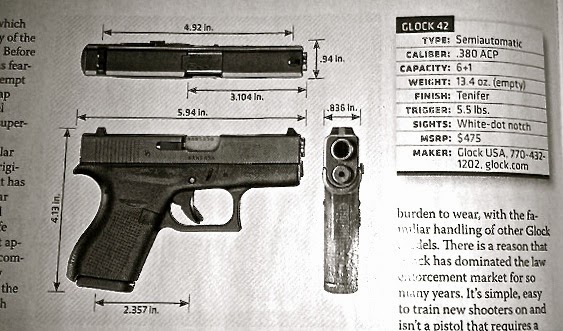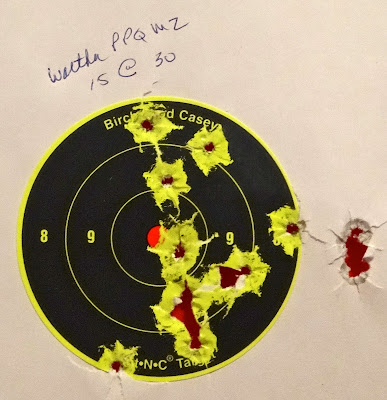OK, pay attention as this is one you should have for three reasons:
1. Accuracy
2. Ergonomics
3. Speed
Now, you may be asking yourself "Hey Joe, what's the difference between the original PPQ and the PPQ M2"? Well, I'm glad you asked that question because I am prepared to answer your question.
The original PPQ utilized an ambidextrous paddle style magazine release which did not go over well with the U.S. consumer so they changed to to an ambidextrous standard grip frame mounted mag release button and renamed it the M2.
Before I get too caught up in the superlatives let's go over what you get with the PPQ:
- They come chambered for the 9mm or .40 S&W. My test specimen was the 9mm.
- 4 inch barrel
- A published trigger pull of 5.6 pounds although my pistol's pull is coming in at 4.12 pounds
- A capacity of 15 rounds
- Overall length of 7.1 inches
- A height of 5.3 inches
- Width of 1.3 inches
- Weight of 1.5 pounds
- 3 dot sights
- With an adjustable rear sight
- Tenifer treated slide and barrel (remember Tenifer is a hardening treatment and not a metal finish)
- Front and rear slide serrations
- Ambidextrous slide release
- Accessory rail
- 3 passive safeties
- Ambidextrous magazine release
- Ergonomic grip with wide finger grooves and replaceable back strap inserts
- The PPQ is also available with a five inch barrel
There are several factors that contribute to the shooter's ability to effectively shoot a pistol. The first factor (and these are in no particular order) is how the pistol fits the hand and heres what I mean by that:
- The pistol feels "good" in the hand both in terms of the grip and balance. It should feel like an extension of your hand and arm. The interchangeable back straps on the PPQ will help you get a good fit along with the bore axis which sits low in your hand.
- The pistol shouldn't move around in your hand during recoil. The finger grooves on the PPQ along with the wrap-around texture of the grips will ensure that the pistol stays in your grip during firing. This will also help you make quick and accurate follow-up shots.
- The controls on the pistol should not require you to change the position of the pistol in your hand in order to manipulate them. The only controls on the PPQ are the slide and magazine releases and they are within easy reach of my thumb.
The second factor is the trigger pull and the pull on the PPQ is fantastic. My specimen measures an average of 4.12 pounds. The published trigger pull is 5.6 pounds which should not cause you to pull your shots to one side or the other.
The last factor is the sights and the sights on the PPQ are easy to see. The rear sight is wide which helps you to quickly pick up the front sight and it is also adjustable for windage.
So let's see how she shoots!
The first five targets were all shot at 21 feet:
Here's 15 rounds at 30 feet:
Here's 25 rounds at 40 feet. The group opened up but all would be center mass hits.
Here's 23 rounds fired at 50 feet. The group is not substantially worse than the 40 foot target.
Here's 15 rounds fired at 75 feet. Two rounds missed the target but all in all this is not bad 75 foot shooting for me.
If you're a fan of striker-fired polymer framed defensive pistols this has the best trigger, best ergonomics, and best accuracy of any of it's competitors. I am seeing it available online in a wide range of prices with a starting figure of $529.00 ranging upward to $739.00.











































